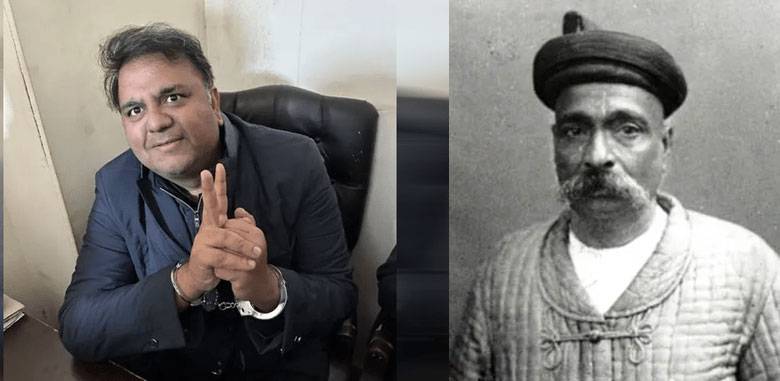
The spree of arrests on charges of sedition highlights the continuation of colonial measures to deal with rival voices. Fawad Chaudhary is the most recent case.
This is not the first time in the history of subcontinent that such a measure was adopted. In 1897, Bal Gangadhar Tilak, known for his criticism of the British, was charged for sedation for his views in Marathi newspaper, Kesari. This started a long practice of the colonisers to curb dissent through charges of sedation.
The same tactic of silencing dissent on sedation charges was again employed by the colonisers in 1922 against Gandhi when he was sentenced to six years of imprisonment for an ‘attempt to excite disaffection towards the British government’.
What exactly is sedation? Section 124-A of the Pakistan Penal Code (PPC) states, “whoever by words, either spoken or written… brings or attempts to bring into hatred or contempt… towards, the Federal or Provincial Government established by law shall be punished…” for sedation.
However, this provision of law ought to be interpreted within the ambit of the constitution of Pakistan. As far as the constitution is concerned it has attached, and rightly so, great importance to the freedom of speech under article 19. Although there are restrictions on the freedom of speech, such restriction needs to be “reasonable” and cannot be to further political motives.
The recent arrests on the pretext of sedation seems far from being “reasonable” and has once again resurrected the colonial way of curbing those who present the opposite view.
Such cases prompt us to question the value we attach to our freedoms. Unfortunately, a tolerant approach towards criticism has never been adopted in Pakistan. It is not hard to find examples in our history where political opponents were sent to jail or termed as “ghadaar” (traitor). The recent arrests, fuelled by political motives, reflect that we are still governed by the same dictatorial, totalitarian, and colonial mindset.
High-ups in the corridors of power must understand that draconian measures to curb fundamental freedoms which are beyond “reasonable” would be nothing but a betrayal of the spirit and idea of Pakistan. They must ensure that law is not used for reasons other than in the expedition for justice. In a society with an already crumbling trust in the judicial system, dragging law and judiciary into the political game will only lead to disastrous consequences.
This is not the first time in the history of subcontinent that such a measure was adopted. In 1897, Bal Gangadhar Tilak, known for his criticism of the British, was charged for sedation for his views in Marathi newspaper, Kesari. This started a long practice of the colonisers to curb dissent through charges of sedation.
The same tactic of silencing dissent on sedation charges was again employed by the colonisers in 1922 against Gandhi when he was sentenced to six years of imprisonment for an ‘attempt to excite disaffection towards the British government’.
What exactly is sedation? Section 124-A of the Pakistan Penal Code (PPC) states, “whoever by words, either spoken or written… brings or attempts to bring into hatred or contempt… towards, the Federal or Provincial Government established by law shall be punished…” for sedation.
Unfortunately, a tolerant approach towards criticism has never been adopted in Pakistan. It is not hard to find examples in our history where political opponents were sent to jail or termed as “ghadaar” (traitor). The recent arrests, fuelled by political motives, reflect that we are still governed by the same dictatorial, totalitarian, and colonial mindset.
However, this provision of law ought to be interpreted within the ambit of the constitution of Pakistan. As far as the constitution is concerned it has attached, and rightly so, great importance to the freedom of speech under article 19. Although there are restrictions on the freedom of speech, such restriction needs to be “reasonable” and cannot be to further political motives.
The recent arrests on the pretext of sedation seems far from being “reasonable” and has once again resurrected the colonial way of curbing those who present the opposite view.
Such cases prompt us to question the value we attach to our freedoms. Unfortunately, a tolerant approach towards criticism has never been adopted in Pakistan. It is not hard to find examples in our history where political opponents were sent to jail or termed as “ghadaar” (traitor). The recent arrests, fuelled by political motives, reflect that we are still governed by the same dictatorial, totalitarian, and colonial mindset.
High-ups in the corridors of power must understand that draconian measures to curb fundamental freedoms which are beyond “reasonable” would be nothing but a betrayal of the spirit and idea of Pakistan. They must ensure that law is not used for reasons other than in the expedition for justice. In a society with an already crumbling trust in the judicial system, dragging law and judiciary into the political game will only lead to disastrous consequences.

